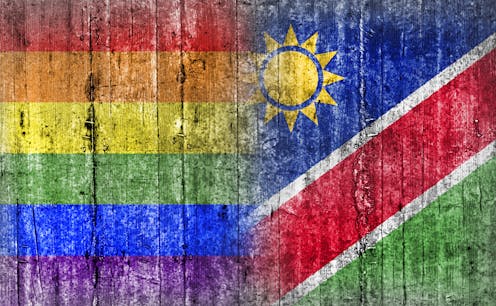
The Namibian high court recently invalidated the country’s colonial-era “sodomy law”, which had made consensual sexual acts between men a criminal offence. The court declared that the common law offences of “sodomy” and “unnatural sexual offences” were unconstitutional. This ruling follows a separate decision in 2023 where Namibia’s supreme court ruled to recognise certain same-sex unions contracted outside the country. These two cases are being celebrated as victories for LGBTIQ+ rights in the country and the continent – following similar rulings in South Africa (1998), Botswana (2019) and Mauritius (2023). We asked human rights law lecturer John Nakuta about the ruling.
Who brought the high court case and why?
The case was brought by a Namibian gay citizen, Friedel Laurentius Dausab. He requested the court to declare the common law offences of sodomy and unnatural sexual offences, as well as a range of other statutory provisions that incorporate these offences, unconstitutional. He regarded these offences as unfair, irrational and discriminatory against him and other gay men on the basis of sex and sexual orientation. He also strongly asserted that these laws infringed his other constitutional rights, such as equality, dignity, privacy, freedom of expression and freedom of association.
What was the court’s reasoning for its ruling?
The court essentially found the laws on sodomy and unnatural sexual offences were not consistent with the right to equality and the right to not be discriminated against. For instance, while consensual sexual acts – anal sex and mutual masturbation – between men are criminalised, these sexual acts between a man and a woman, or between women, are not criminalised. This was found to be arbitrary and irrational and serving no legitimate purpose. Especially when viewed against the backdrop of the harmful impact these laws have on gay men. They were therefore found to be overly intrusive and violating a wide range of rights of gay men. These offences were accordingly declared unconstitutional and invalid.
Read more: Being queer in Africa: the state of LGBTIQ+ rights across the continent
It’s important to stress that these offences were relics of Namibia’s colonial legal heritage. They were introduced into South West Africa, now Namibia, through Roman-Dutch common law when the territory became a South African mandate in the wake of the first world war. They were introduced as a means of colonial control and they reflect colonial-era values. They were maintained after independence without question.
What message is being sent?
The take-home message of the case is that the law should not be used as a weapon to discriminate against vulnerable groups, including those discriminated against because of their sexual orientation or gender identity. The private moral views of a section of the community (even if it represents the majority) cannot be used as justification to treat people unequally and disrespect their inherent human worth (dignity).
How does this tie in with last year’s ruling on same-sex marriage?
This latest case boldly reaffirms the position of Namibia’s top court, the supreme court, in a separate ruling in 2023.
In 2023 the supreme court ruled that same-sex marriages lawfully concluded outside Namibia should equally be recognised at home – as is the case with heterosexual marriages entered into outside Namibia. This ruling was also in line with the equality and non-discrimination dictates of the Namibian constitution.
What pushback from politicians was there to the 2023 ruling?
Shortly after the 2023 ruling on same-sex marriage, a member of the National Assembly, Jerry Ekandjo, introduced two “private member’s” bills (the Ekandjo Bills) to counter the supreme court’s rulings. These bills criminalise same sex marriages in Namibia, and the promotion of such marriages. They effectively limit marriage to heterosexual couples. The bills were hastily passed by both houses of parliament and are currently waiting for the president to sign them into law.
But it appears that both the late president, Hage Geingob, and his successor, Nangolo Mbumba, may have reservations about the constitutionality of the bills. Namibia’s constitution allows the president to withhold his or her assent to a bill and refer it back to parliament to reconsider. But, as yet, they have neither been sent back to parliament nor signed into law.
In my view the president must stop being indecisive and take a stand. This matter requires bold and active leadership. I would argue that the Ekandjo Bills are also glaringly in conflict with the Namibian constitution. And they will not be able to co-exist with the recent high court sodomy ruling.
What happens next about the new sodomy law ruling?
The Namibian government is allowed to take this matter on appeal within 21 days of the ruling. The likelihood of it doing that is high. This is an election year in Namibia. LGBTIQ+ rights, unfortunately, remain a contentious and polarised political issue. In my view it provides the ruling elite with a handy way to divert attention from the substantive social issues that plague the country, like poverty, unemployment and inequality.
But there is no doubt that this ruling is a great win for human rights in Namibia. It affirms that all human beings are born free and equal in dignity and rights, including those from the LGBTIQ+ community. The ruling also displays a commitment from the Namibian judiciary, namely, that it will not abdicate its constitutional responsibility to enforce the Namibian bill of rights. At the time of writing, “sodomy” and “unnatural sexual offences” are no longer criminal offences in the Namibian legal order. Both the common law and the statutes which incorporated these offences have been declared unconstitutional and invalid.
John Nakuta is a trustee of the Economic, Social Justice Trust (ESJT) of Namibia that promotes and advocates for economic and social justice. His views here, however, are his own and do not represent the views of the ESTJ.
This article was originally published on The Conversation. Read the original article.







